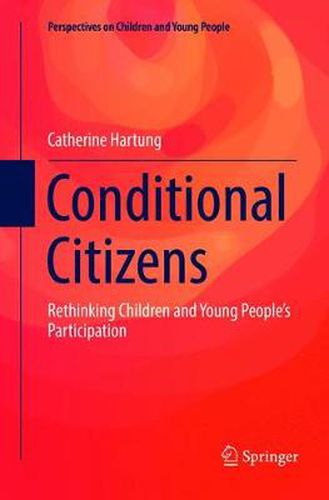Readings Newsletter
Become a Readings Member to make your shopping experience even easier.
Sign in or sign up for free!
You’re not far away from qualifying for FREE standard shipping within Australia
You’ve qualified for FREE standard shipping within Australia
The cart is loading…






This title is printed to order. This book may have been self-published. If so, we cannot guarantee the quality of the content. In the main most books will have gone through the editing process however some may not. We therefore suggest that you be aware of this before ordering this book. If in doubt check either the author or publisher’s details as we are unable to accept any returns unless they are faulty. Please contact us if you have any questions.
This book challenges readers to recognise the conditions that underpin popular approaches to children and young people’s participation, as well as the key processes and institutions that have enabled its rise as a global force of social change in new times. The book draws on the vast international literature, as well as interviews with key practitioners, policy-makers, activists, delegates and academics from Japan, South Africa, Brazil, Nicaragua, Australia, the United Kingdom, Finland, the United States and Italy to examine the emergence of the young citizen as a key global priority in the work of the UN, NGOs, government and academia. In so doing, the book engages contemporary and interdisciplinary debates around citizenship, rights, childhood and youth to examine the complex conditions through which children and young people are governed and invited to govern themselves.
The book argues that much of what is considered ‘children and young people’s participation’ today is part of a wider neoliberal project that emphasises an ideal young citizen who is responsible and rational while simultaneously downplaying the role of systemic inequality and potentially reinforcing rather than overcoming children and young people’s subjugation. Yet the book also moves beyond mere critique and offers suggestive ways to broaden our understanding of children and young people’s participation by drawing on 15 international examples of empirical research from around the world, including the Philippines, Bangladesh, the United Kingdom, North America, Finland, South Africa, Australia and Latin America. These examples provoke practitioners, policy-makers and academics to think differently about children and young people and the possibilities for their participatory citizenship beyond that which serves the political agendas of dominant interest groups.
$9.00 standard shipping within Australia
FREE standard shipping within Australia for orders over $100.00
Express & International shipping calculated at checkout
This title is printed to order. This book may have been self-published. If so, we cannot guarantee the quality of the content. In the main most books will have gone through the editing process however some may not. We therefore suggest that you be aware of this before ordering this book. If in doubt check either the author or publisher’s details as we are unable to accept any returns unless they are faulty. Please contact us if you have any questions.
This book challenges readers to recognise the conditions that underpin popular approaches to children and young people’s participation, as well as the key processes and institutions that have enabled its rise as a global force of social change in new times. The book draws on the vast international literature, as well as interviews with key practitioners, policy-makers, activists, delegates and academics from Japan, South Africa, Brazil, Nicaragua, Australia, the United Kingdom, Finland, the United States and Italy to examine the emergence of the young citizen as a key global priority in the work of the UN, NGOs, government and academia. In so doing, the book engages contemporary and interdisciplinary debates around citizenship, rights, childhood and youth to examine the complex conditions through which children and young people are governed and invited to govern themselves.
The book argues that much of what is considered ‘children and young people’s participation’ today is part of a wider neoliberal project that emphasises an ideal young citizen who is responsible and rational while simultaneously downplaying the role of systemic inequality and potentially reinforcing rather than overcoming children and young people’s subjugation. Yet the book also moves beyond mere critique and offers suggestive ways to broaden our understanding of children and young people’s participation by drawing on 15 international examples of empirical research from around the world, including the Philippines, Bangladesh, the United Kingdom, North America, Finland, South Africa, Australia and Latin America. These examples provoke practitioners, policy-makers and academics to think differently about children and young people and the possibilities for their participatory citizenship beyond that which serves the political agendas of dominant interest groups.